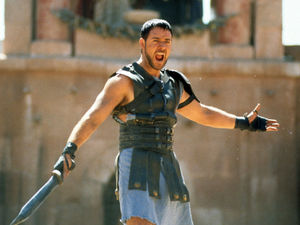Film Talk: 'Are you not entertained?' Looking back at Gladiator
The general who became a slave. The slave who became a gladiator. The gladiator who defied an Emperor... and the Aussie who brought the swords and sandals genre back to the people.

Directed by Ridley Scott, 2000’s Gladiator is a no-nonsense masterpiece that remains one of its esteemed director’s greatest efforts to date.
An epic tale of bloodshed, honour, empire and vengeance, this captivating historical drama was written by David Franzoni, John Logan and William Nicholson, and was co-produced by DreamWorks and Universal.
Starring Russell Crowe, Joaquin Phoenix, Connie Nielsen and Oliver Reed, the flick tells the tale of proud Roman general Maximus (Crowe), and the quest for revenge that takes him to the gladiatorial arena after his family is slain on the orders of the scheming new Emperor, Commodus (Phoenix).
Inspired by Daniel P. Mannix’s 1958 book, Those About to Die, Gladiator’s script, initially written by Franzoni, was acquired by DreamWorks and Scott signed on to direct. Principal photography began in January 1999, before the script was in fact completed, and wrapped up in May of that year, with the scenes of Ancient Rome shot over a period of 19 weeks in Malta.
With a supporting cast including Ralf Möller, Djimon Hounsou, Derek Jacobi, David Schofield, John Shrapnel, Richard Harris, and Tommy Flanagan, Gladiator racked up the talent like there was no tomorrow. The budget was ample, and the pressure was most definitely on, but the buzz was high. However, would Gladiator find victory, or would it be ‘thumbs down’ in the arena all the way?
In the year 180AD, powerful Roman general Maximus Decimus Meridius has just defeated the last of the German tribes and is beloved by both his soldiers and the ageing Emperor, Marcus Aurelius (Harris).
Before his death, the Emperor chooses Maximus to be his successor, acknowledging Maximus’s modesty as the thing that makes him perfect for the role, and forsaking his own ambitious son, Commodus.
Once Commodus learns of his father’s intentions however, he murders him before news of his wishes can reach the Emperor’s inner circle, including Commodus’s sister, Lucilla (Nielsen) and the powerful senators Gracchus (Jacobi) and Falco (Schofield).
When Maximus refuses to embrace Commodus as the new emperor, the once-beloved general is forced to flee for his life and race home to protect his wife and son from Commodus’s wrath.
As tragedy strikes however, he soon finds himself captive and forced into slavery. Taken to Africa, Maximus is purchased by trainer of gladiators and former arena champion, Proximo (Reed). Though at first reluctant to fight in the arena, Maximus achieves success after success and becomes a fan-favourite. When Commodus announces 150 days of gladiatorial games in Rome to honour his late father, Maximus soon realises this may be his chance to once again get close enough to the new Emperor to exact the revenge he seeks...
Grossing $187.7 million in the US and $457 million worldwide, Gladiator was a fantastic box office success. The flick attracted praise for its acting and Scott’s direction, as well as the visuals, screenplay, action sequences and musical score. The second highest-grossing film of 2000, Gladiator won five Oscars including Best Picture, and Best Actor for Crowe, and four BAFTAs including Best Film.
A triumph of a flick that was perfect for the big screen experience, Gladiator has stood the test of time for two decades. It also paved the way for films such as 2003’s The Last Samurai, 2004’s Troy, and 2005’s Kingdom of Heaven – the last of which, incidentally, was also directed by Scott.
An indisputably brilliant turn by Crowe in front of the camera and Scott behind it, Gladiator provided a fantastic canvass for the excitement of the ancient world to return to cinema, and a fittingly superb stage for the final outing of the brilliant Oliver Reed.





